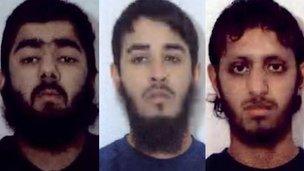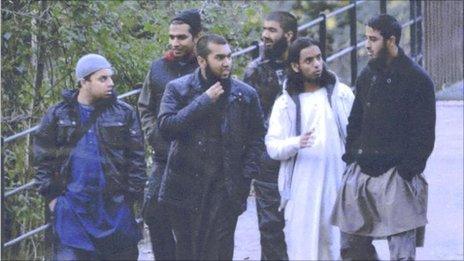Nine jailed over bomb plot and terror camp plan
- Published

Usman Khan, Mohammed Shahjahan and Nazam Hussain were described as Islamic fundamentalists
Nine men who plotted to bomb the London Stock Exchange and build a terrorist training camp have been jailed.
Three of the men - all members of an al-Qaeda inspired terror group - received indeterminate sentences for public protection at London's Woolwich Crown Court.
The court heard they had planned to raise funds for a terrorist camp in Pakistan and recruit Britons to attend.
The nine come from Stoke-on-Trent, Cardiff and London.
In sentencing, the judge described all the men - who are British nationals of Bangladeshi and Pakistani origin - as Islamic fundamentalists.
The three to receive indeterminate sentences for the terror camp plan included Mohammed Shahjahan 27, of Stoke-on-Trent, who was jailed for a minimum term of eight years and 10 months.
Usman Khan, 20, and Nazam Hussain, 26, also from Stoke-on-Trent, were ordered to serve at least eight years.
Judge Mr Justice Wilkie said these three were "the more serious jihadists" and said they should not be released until they were no longer a threat to the public.
The court heard they planned to establish the terrorist camp on land in Pakistan-controlled Kashmir owned by Khan's family and encourage a "significant" number of British Muslims to undergo training there.
Khan and Hussain planned to travel to the camp and receive military instruction themselves before "obtaining first-hand terrorist experience in Kashmir", the hearing was told.
Passing sentence, Mr Justice Wilkie said this was a "serious, long-term venture in terrorism" that could also have resulted in atrocities in the UK.

The police kept the men under surveillance for some time before arresting them
"It was envisaged by them all that ultimately they and the other recruits may return to the UK as trained and experienced terrorists available to perform terrorist attacks in this country, on one possibility contemplated in the context of the return of British troops from Afghanistan."
Four others, who all pleaded guilty to engaging in conduct in preparation for acts of terrorism by planning to plant a bomb in the toilets of the London Stock Exchange, were:
Gurukanth Desai, 30, from Cardiff: 12 years
Abdul Miah, 25, from Cardiff: 16 years, 10 months
Mohammed Chowdhury, 22, from London: 13 years, 8 months
Shah Rahman, 28, from London: 12 years
Omar Latif, 28, from Cardiff, admitted attending meetings with the intention of assisting others to prepare or commit acts of terrorism. He was given a sentence of 10 years and 4 months.
Mohibur Rahman, 28, from London, was given a five-year sentence after he admitted to possessing two editions of an al-Qaeda magazine for terrorist purposes.
All nine men were arrested in December 2010. Each pleaded guilty to terrorism charges on the eve of their trial at Woolwich Crown Court.
Andrew Edis QC, prosecuting, said between them the nine men possessed "almost every famous jihadi publication" including copies of an online al-Qaeda magazine called Inspire which carries features such as how to "Make a bomb in the kitchen of your mom".
He told the court the nine had decided to form a group in October 2010 to "support and commit acts of terrorism in furtherance of their religious belief".
Piers Arnold, a lawyer for the Crown Prosecution Service, said the men were motivated by extreme Jihadist propaganda circulated on the internet by organisations like al-Qaeda.
"These nine men were not members of al-Qaeda but they were clearly influenced by the message of that organisation and in particular by the teachings of the American-born ideologue, Anwar Al-Awlaki, who died in a drone attack in Yemen last year."
He said Al-Awlaki was a key contributor to Inspire magazine which urged readers to attack Western countries by any means possible to cause death, fear and economic damage.
Metropolitan Police Deputy Assistant Commissioner Stuart Osborne said the counter terrorism operation was "one of the most significant and complex" of recent years, and involved 1,000 police officers and staff at its height.
"We had a network of highly dangerous men based in three cities who were working together to plan terrorist attacks in the UK.
"Had we not taken action to disrupt this network, their actions could have resulted in serious casualties or fatalities," he added.
- Published9 February 2012
- Published8 February 2012
- Published7 February 2012
- Published6 February 2012
- Published1 February 2012